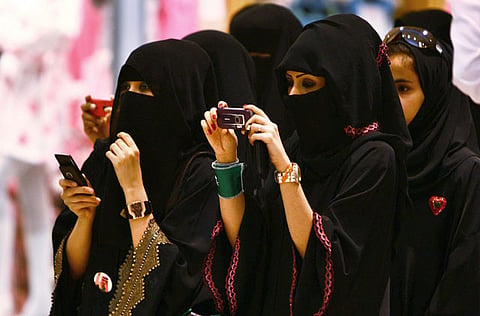Saudi women should aim for equal rights, activist says
Saudi Arabia's King Abdullah says women to have a role in the Shura Council

Dubai: In an unexpected and warmly received move, Saudi Arabia's King Abdullah Bin Abdul Aziz announced on Sunday that women in the conservative kingdom will be allowed to vote and run in municipal elections and will have a role in the Shura (advisory) Council.
"It is a historic decision. I can't describe how appropriate and right the decision it is," prominent Saudi woman activist and university teacher Hatoon Al Fasi said. "It gives the feeling that there is an echo to our voices. The Custodian of the Two Holy Mosques [King Abdullah] realises the dangers of marginalisation, which the Saudi woman was subjected to," she added in an interview with Gulf News.
King Abdullah, in a surprise move, declared in his speech at the opening session of the new term of the Shura Council that women will have the right to vote and run for municipal council elections.
"Starting with the next term, women will have the right to run in municipal elections and to choose candidates, according to Islamic principles," he said.
"We have decided that women will participate in the Shura Council as members starting the next term," the king added. "The Muslim woman... must not be marginalised in opinion or advice." Earlier, many women activists were hoping the September 29 elections would be delayed.
The women should not limit themselves to seeking political roles alone but should set their sights on equal rights, Hatoon said.
Hatoon believes women should aim even higher. King Abdullah also wants women to "join the all-male" Shura Council, whose members he appoints. "Because we refuse to marginalise women in society in all roles that comply with Sharia, we have decided, after deliberation with our senior ulama [clerics] and others... to involve women in the Shura Council as members, starting from the next term," King Abdullah said in a speech delivered to the advisory body. "Women will be able to run as candidates in the municipal election and will even have a right to vote." The Shura Council vets legislation but cannot veto laws or enforce changes.
Hatoon said: "I hope we don't enter the maze of interpretation" of the king's decision. She hopes that an equal number of seats will be divided for men and women in both municipal and Shura councils. Several months earlier, nearly 60 intellectuals and activists called for a boycott of the elections because of several reasons which include the fact that the councils "lack the authority to effectively carry out their role," "half of their members are appointed" and because they exclude women. The Shura Council, which has several women who sit only as observers, had recommended that women be allowed to vote in the next local elections. Last April, Samar Badawi, a Saudi woman activist, said she was suing the Municipal Affairs Ministry for upholding a ban on women taking part in the local elections. She filed a suit against the ministry at the Administrative Court in Makkah.
In the same month, a group of women defied the ban by turning up at a voter registration office in
the Red Sea city of Jeddah, but were turned back by the head of the centre. Women's advocates have been fighting to win more rights for women in the consevative kingdom, including the right to drive.
When some women tried to break the ban, which is more of a social than legal ban, they were detained for few days. But others continued their campaign.
"After the historic decision of the King has been issued, we all realise that anything related to improving the status of Saudi women and their legal status is related to a political decision," Hatoon said. "The same applies to driving cars, and we are waiting for a [similar] decision to be taken in the next few weeks."
Sign up for the Daily Briefing
Get the latest news and updates straight to your inbox



